What is psoriasis?
Psoriasis is a common skin disease affecting 1 in 50 people. It occurs equally in men and women. It can appear at any age. Psoriasis is a long-term condition which may come and go throughout your lifetime. It is not infectious; therefore, you cannot catch psoriasis from someone else. It does not scar the skin although sometimes it can cause a temporary increase or reduction in skin colour. Although psoriasis is a long-term condition there are many effective treatments available to keep it under good control.
Psoriasis can affect the nails and the joints as well as the skin. Psoriatic arthritis produces swelling and stiffness in the joints or stiffness in the lower back and should be managed by a rheumatologist who works closely with your dermatologist and/or your GP.
Psoriasis, particularly moderate to severe psoriasis, is associated with an increased risk of anxiety, depression and harmful use of alcohol. Moderate to severe psoriasis increases the risk of heart disease and stroke and treatment of psoriasis may reduce this risk. Psoriasis can also be associated with diabetes, obesity, venous thromboembolism, high cholesterol and high blood pressure. Psoriasis is also associated with inflammatory bowel disease and there is a small increased risk of skin cancer.

Is psoriasis hereditary?
Yes, if you have a family member affected by psoriasis you are more likely to suffer from psoriasis. The way psoriasis is inherited is complex and not completely understood involving many genes.
What are the symptoms of psoriasis?
- Psoriasis may not have any associated symptoms, but it can be itchy and painful. Certain sites such as the scalp, lower legs and groin can be particularly itchy. If psoriasis affects the hands and feet, painful fissures (cracks) can develop and these can affect use of the hands and walking. Severe psoriasis on the body can also develop cracks which are painful and can bleed.
- Psoriasis can affect the nails and lifting away of the nail from the finger can be painful.
- Psoriatic arthritis produces pain, swelling and stiffness in one or more joints, particularly in the morning.

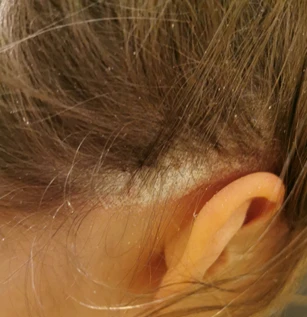
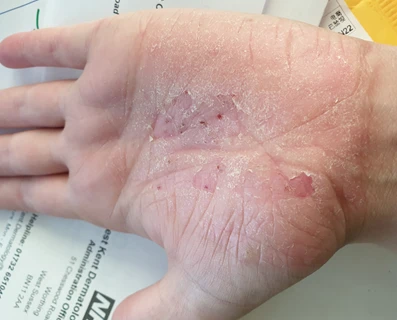
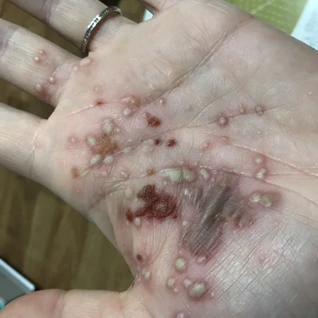
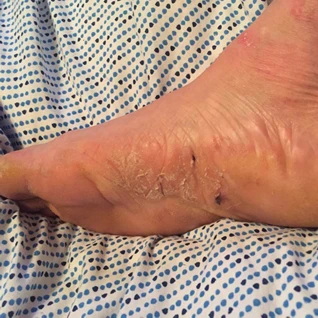
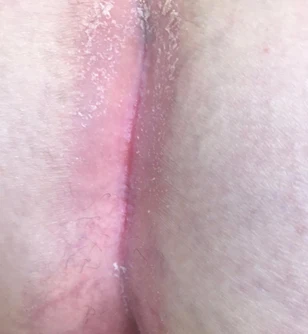
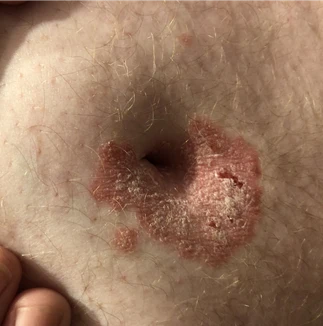
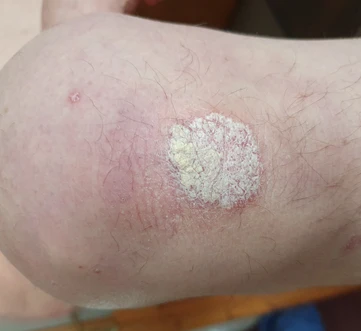
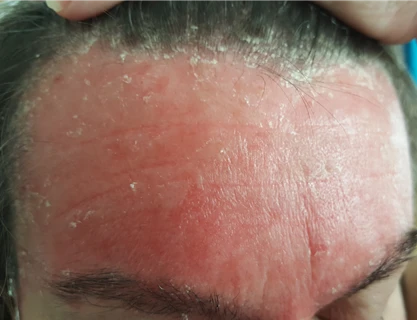
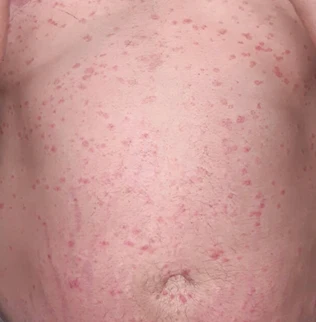
What does psoriasis look like?
The skin changes of psoriasis (often known as plaques) are well defined and slightly raised pink or red (can differ in colour depending on your skin colour) areas with silvery-white scales. Many people have just a few plaques but some individuals with moderate to severe psoriasis may have several plaques covering large areas of their body.
Nail psoriasis
Nail psoriasis is present in about half of people with psoriasis.
The features of nail psoriasis are:
- Pitting (indentations) and ridging of the surface of the nail.
- Salmon pink areas of discolouration under the nail.
- Separation of the nail plate from the nail bed.
- Thickening and yellowing of the nails.
- Complete nail destruction.
How is psoriasis assessed?
Psoriasis should be assessed at diagnosis, before your first referral to a specialist, every time you see a specialist and to assess your response to treatment. Psoriasis may be assessed by your doctors using a variety of scores which measure the severity in your skin and joints, how psoriasis is affecting your mood and your activities of daily living and whether you are at risk of heart disease.
These scores include the PASI (Psoriatic Arthritis Severity Index – a score that measures the severity of joint symptoms in psoriasis) and DLQI (Dermatology Life Quality Index – a score that measures the impact of psoriasis on your daily activities)
Can psoriasis be cured?
There is no cure for psoriasis and complete clearance of skin lesions may not always be possible. There are several effective treatments available to control your psoriasis. Spontaneous clearance of psoriasis may occur in some people.
Treatments for psoriasis
Treatment of psoriasis depends upon your individual circumstances. Treatment applied to the surface of your skin (topical treatment) is sufficient alone in most patients. For people with more extensive or difficult to treat psoriasis, ultraviolet light treatment (phototherapy), tablet treatment or injection treatment may be required.
Topical treatments
These include creams, ointments, gels, pastes and lotions.
Phototherapy
- Phototherapy is ultraviolet light delivered in a controlled way to treat psoriasis. A course of treatment usually takes about 8-10 weeks and will require treatment sessions two to three times a week. This usually means attending a Phototherapy Unit in a hospital.
- Two types of light are used: narrowband ultraviolet B light (nbUVB/TLO1) and ultraviolet A light (PUVA). The latter requires a sensitiser, known as a psoralen, that can be taken as a tablet or added to a bath prior to treatment.
Internal (systemic) treatments
- Tablet options include acitretin (related to vitamin A), ciclosporin (suppresses the immune system), methotrexate (slows down the rate at which cells are dividing in psoriasis), and in some hospitals fumaric acid esters and apremilast.
- Injectable treatments for psoriasis include etanercept, adalimumab, infliximab, ustekinumab, secukinumab, ixekizumab and guselkumab. Other new tablet and injected treatments are being developed in clinical studies at present.
- Blood tests may be recommended by your GP or dermatologist. If you are considering tablet or injection treatment for your psoriasis, then blood tests will be needed before and during treatment.
What can I do to help?
- Discuss your psoriasis and how it affects your life with your GP or dermatologist and identify treatment goals.
- Manage your risk factors for heart disease and stroke with your GP.
- Adopt a healthy lifestyle: eat a balanced diet, try to lose weight if you are overweight and exercise regularly.
- Stop smoking if you smoke.
- If you drink excessive alcohol, reducing your intake might be helpful.
- Reduce stress, where possible.
- Take your medications as recommended by your GP or dermatologist.
- If you have pain in your joints discuss with your GP or dermatologist.
Where can I get more information about psoriasis?
NICE guidance on the assessment and management of psoriasis [CG153]:
www.nice.org.uk/guidance/cg153/informationforpublic
Links to patient support groups:
The Psoriasis Association
Dick Coles House
2 Queensbridge
Northampton, NN4 7BF
Tel: 0845 676 0076
Download MySkinDoctor today
Psoriasis and Psoriatic Arthritis Alliance (PAPAA)
3 Horseshoe Business Park
Lye Lane
Bricket Wood
St Albans
Hertfordshire
AL2 3TA
Tel: 01923 672837



